Here's the lowdown on what makes German Shepherd Rottweiler Mix (Shepweilers) so special:
-
A dynamic duo: We'll dive deep into the German Shepherd and Rottweiler traits that make this mix so unique.
-
Personality plus: Discover their temperament and how to create the perfect home for your Shepweiler.
-
Training and exercise: Learn the best ways to keep your Shepweiler happy, healthy, and out of trouble.
-
Health and diet: We'll cover everything you need to know to keep your Shepweiler thriving.
-
Finding your perfect pup: Get the scoop on finding reputable breeders and giving a rescue Shepweiler a second chance.
Ready to unleash the awesomeness of the Shepweiler? Let’s dive in!
Shepweiler History: A Paw-some Pedigree
Ever wonder where these awesome dogs came from? Well, Shepweilers are like the superhero offspring of two legendary working breeds: the German Shepherd and the Rottweiler. Bred in the 1990s, these “designer dogs” were created to be the ultimate all-rounders, rocking skills like guarding, police work, and even helping people with disabilities.
But their story goes way back! German Shepherds were the original herding superstars, while Rottweilers were ancient Roman guardians and all-around tough guys. Mix those two together, and bam! You’ve got a Shepweiler – a dog with brains, brawn, and a heart of gold.

So, now you know the Shepweiler’s not just a pretty face (though they are pretty darn handsome, aren’t they?). They’ve got a legacy of loyalty and a whole lot of love to give. Ready to learn more about these amazing dogs? Let’s dive in!
Breed Characteristics: Where German Shepherd Met Rottweiler
Want to know what happens when two of the world’s most impressive working breeds join forces? Get ready to be amazed by the Shepweiler! This dynamic mix inherits the best of both worlds, resulting in a dog that’s as brilliant as it is brawny.
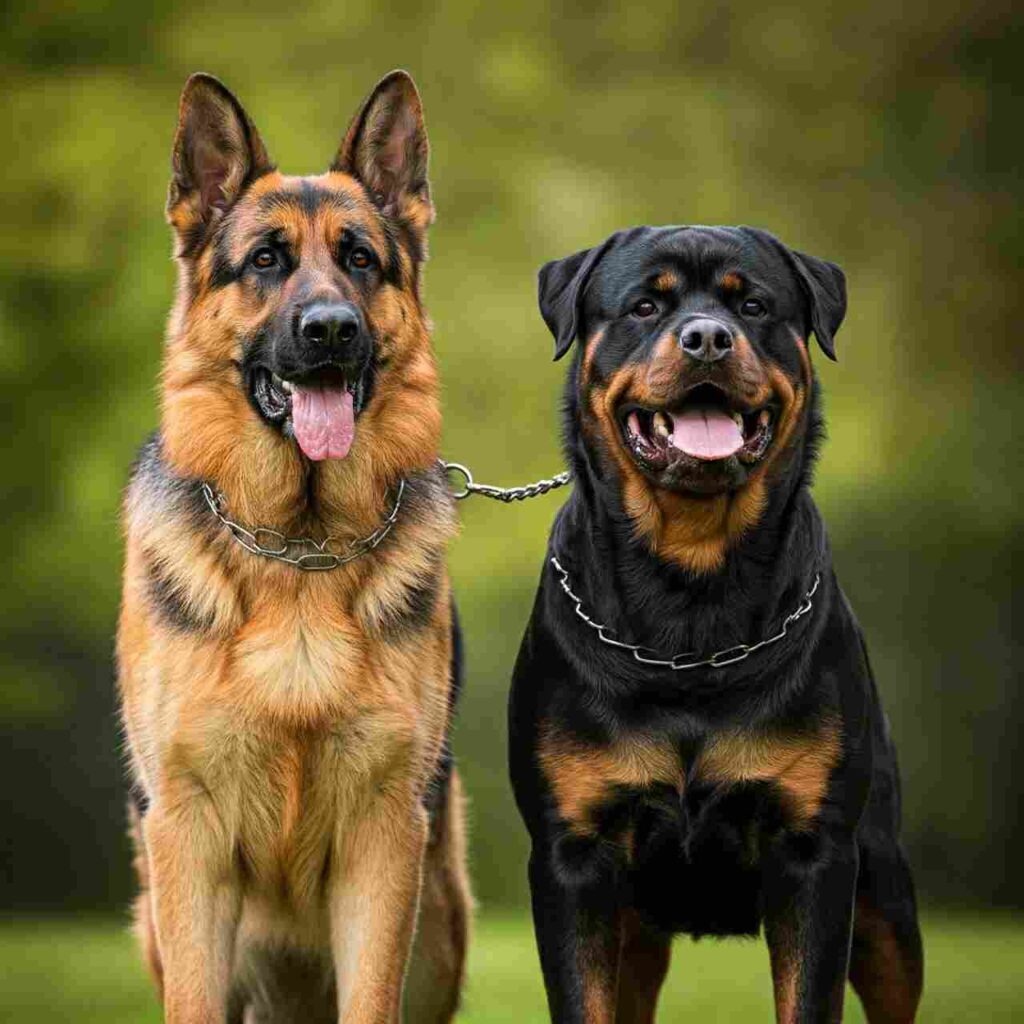
Parent Breeds: A Legacy of Loyalty and Strength
- German Shepherd: The ultimate overachiever! These intelligent and hardworking dogs have a long history as herding and service dogs. They’re known for their loyalty, trainability, and sometimes-serious demeanor. Think of them as the valedictorian of the canine world – always eager to learn and please.
- Rottweiler: The gentle giant with a heart of gold (and a protective streak a mile wide!). Rottweilers have ancient Roman roots as guardians and protectors. They’re powerful, devoted to their families, and always ready to defend their loved ones. Think of them as the loyal, loving bodyguard you always wanted.
Appearance: A Beautiful Blend
Variety is the spice of life, and that’s definitely true for Shepweilers! They inherit a unique mix of traits from their parents, resulting in a stunning array of looks.
- Coat Colors: You might see the classic black and tan of a German Shepherd, the rich mahogany markings of a Rottweiler, or a striking combination of both. Sable, black, and even blue coats are possible!
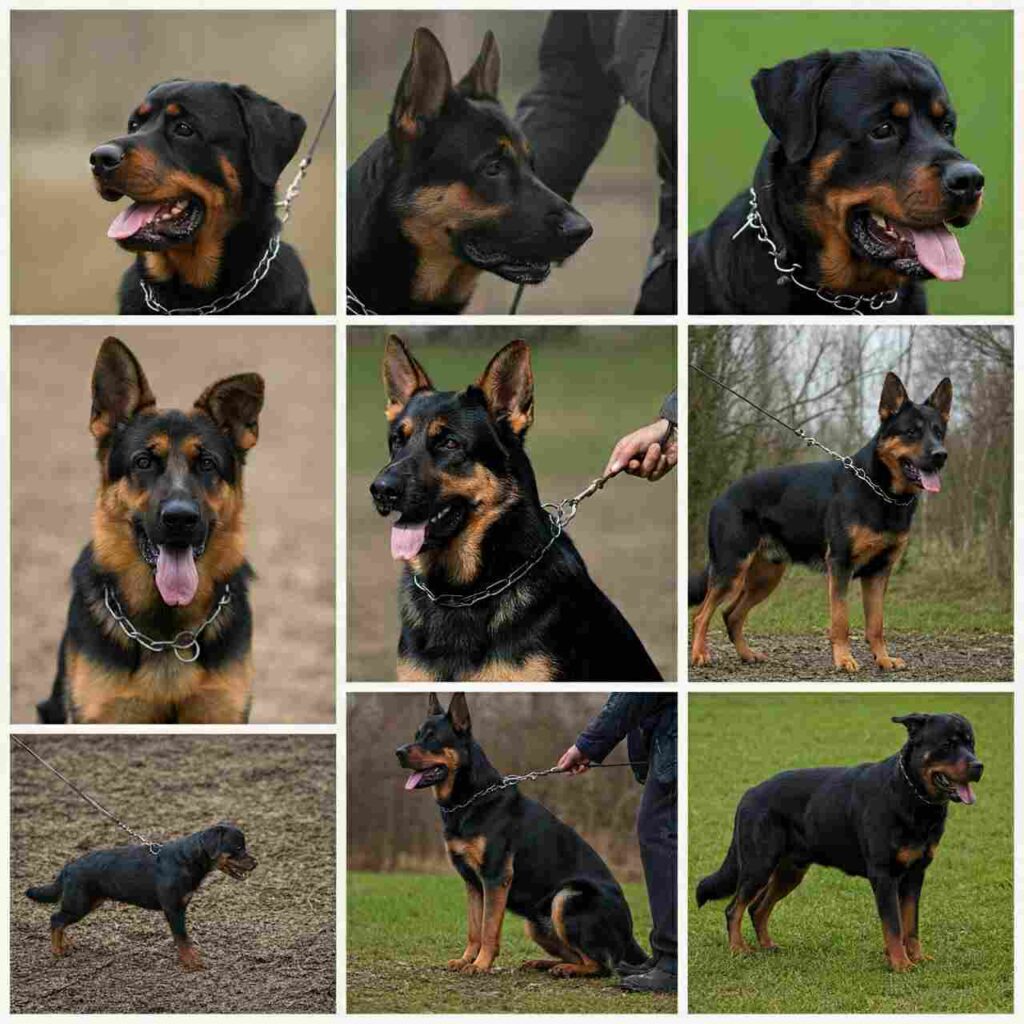
- Size: Shepweilers are typically large dogs, but their exact size can vary. Expect them to be anywhere from 22 to 27 inches tall and weigh between 75 and 115 pounds.
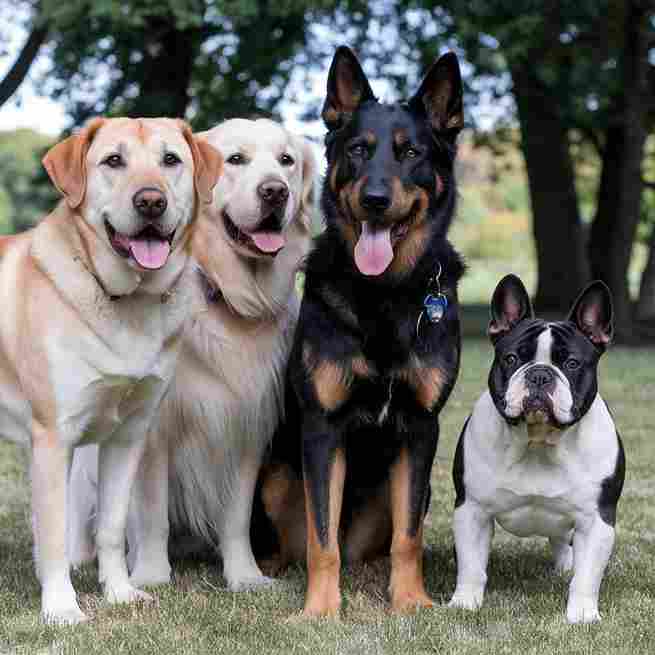
Temperament and Personality: Loyal, Loving, and a Little Bit Mischievous
Shepweilers are the total package when it comes to personality! Here’s what you can expect:
- Loyal to the core: These dogs are deeply devoted to their families. They’ll follow you to the ends of the earth and back (and probably try to sneak onto your lap while they’re at it!).
- Brains and Brawn: Shepweilers are intelligent and eager to please, but they also have a mischievous streak. They’re quick learners, but they might try to test your limits just for fun. Consistent training is key!
- Watchdog Wonders: Alert and protective, Shepweilers will let you know if anything seems out of place. They’re natural guardians, always on the lookout for their loved ones.
- Pack Mentality: Shepweilers thrive in a family environment and love being part of the “pack.” They’ll form strong bonds with everyone in the household.
- Wary of Strangers: Don’t be surprised if your Shepweiler is a bit cautious around new people. It’s just their protective instincts kicking in. Early socialization will help them become more comfortable with strangers.
With their winning combination of loyalty, intelligence, and playful energy, Shepweilers make incredible companions for the right owner. Are you ready for the adventure?
Things to Know When Owning a Shepweiler:
- Strength and Size: Shepweilers are powerful dogs. Be prepared to manage their strength, especially during walks or playtime. Teach them not to jump on people.
- Introductions: Introduce your Shepweiler to other pets slowly and carefully, especially smaller animals. Supervise interactions with children and other dogs.
- Potential for Possessiveness: Shepweilers can be possessive of their food, toys, or even their favorite humans. Address this early with training and ensure everyone in the family interacts with the dog equally.
- Destructive Behaviors: If bored or understimulated, Shepweilers may engage in destructive behaviors like chewing, digging, and barking. Provide plenty of exercise, mental stimulation, and appropriate outlets for their energy.
- Weather Sensitivity: While they have a double coat, Shepweilers can be sensitive to extreme weather. Provide shade and water in hot weather and a warm shelter in cold weather.
By understanding the commitment involved and being prepared to meet their needs, you can ensure a happy and fulfilling life with your Shepweiler sidekick!
Pros and Cons of Owning a Shepweiler: Weighing the Scales
Let’s be honest, no dog is perfect (though Shepweilers come pretty close!). Here’s a balanced look at the pros and cons of owning one of these amazing dogs:
Pros:
- Loyalty and protection: Shepweilers are fiercely loyal and protective of their families.
- Intelligence and trainability: They’re quick learners and eager to please (most of the time!).
- Affectionate and playful: Shepweilers love to cuddle and play with their loved ones.
- Versatility: They can excel in a variety of roles, from family companion to working dog.
Cons:
- High energy: Shepweilers need a lot of exercise and mental stimulation.
- Training commitment: Consistent training is essential to manage their strength and intelligence.
- Potential health concerns: Be aware of potential health issues like hip dysplasia and bloat.
- Size and space: They need a decent amount of space to thrive.
Puppy vs. Adult: Which is Right for You?
- Puppies are undeniably cute and cuddly, and you get to experience all those hilarious puppy antics firsthand. Plus, you can start training and socialization from day one, shaping them into the perfect companion. But be warned, puppies are a lot of work! They need tons of attention, and housebreaking accidents are bound to happen (no matter how many puppy pads you lay down!). Training can also be a bit challenging with those puppy brains still developing.
- On the other hand, adult Shepweilers come with their personalities already formed. You’ll know what you’re getting in terms of energy levels and temperament. Plus, they might already be house-trained and know some basic commands, which can save you a lot of time and effort. But here’s the catch: you might need to work through some pre-existing behavioral quirks, and let’s be honest, you’ll miss out on all that adorable puppyhood.
- Ultimately, the decision is yours! Weigh the pros and cons, consider your lifestyle, and choose the option that best suits your family. Whether you go for a playful pup or a distinguished adult, a Shepweiler is sure to bring a whole lot of love and loyalty into your life.
Living with a German Shepherd Rottweiler Mix: Adventure Awaits!
So you’re ready to welcome a Shepweiler into your home? Awesome! Get ready for a life filled with loyalty, love, and maybe a little bit of mischief. But before you roll out the welcome mat, let’s talk about what it really means to live with one of these amazing dogs.
Family Life: Shepweilers and Kids
Shepweilers can be fantastic family dogs, but there are a few things to keep in mind:
- Supervise with small children: These are big, strong dogs. While they’re generally gentle, accidental bumps and jumps can happen. Always supervise playtime between your Shepweiler and young children.
- Training is key: Teach your kids how to interact with your Shepweiler respectfully and make sure your dog understands boundaries.
- Socialization from day one: Expose your Shepweiler to kids of all ages from a young age to help them become comfortable and confident around little humans.
Home Sweet Home: Space to Roam
Shepweilers are active dogs that need space to stretch their legs (and their brains!).
- A yard is ideal: A fenced-in yard is a Shepweiler’s dream come true! It gives them a safe space to run, play, and explore.
- Apartment living can work: If you live in an apartment, you’ll need to be extra dedicated to providing your Shepweiler with plenty of exercise and mental stimulation. Frequent trips to the dog park or long walks are a must.
- Keep it comfy: Make sure your Shepweiler has a cozy spot to relax indoors, whether it’s a dog bed, a comfy blanket, or (let’s be honest) a prime spot on the couch next to you.
Other Pets: Furry Friends
Shepweilers can generally get along with other dogs, especially if they’re socialized from a young age. However, introductions should always be done slowly and carefully.
- Same-sex aggression: Keep an eye out for potential same-sex aggression, especially between males.
- Small pets: Shepweilers have a strong prey drive, so smaller pets like cats or rabbits may need extra supervision.
Activities and Enrichment: Beat the Boredom
Shepweilers are intelligent and active dogs that need plenty of mental and physical stimulation. Keep them entertained with:
- Dog sports: Agility, obedience, tracking – the possibilities are endless!
- Interactive games: Fetch, tug-of-war, hide-and-seek – keep those brains and bodies engaged.
- Puzzle toys: Challenge your Shepweiler with toys that make them think.
- DIY enrichment: Create your own puzzle toys or set up obstacle courses in your backyard.
Care and Training: Raising a Super-Shep
Okay, you’ve fallen head over paws for the Shepweiler – now what? These energetic, intelligent pups need more than just cuddles and belly rubs (though those are definitely important too!). Let’s break down the essentials of Shepweiler care and training.
Exercise: Release the Energy Beast!
Shepweilers are like little furry dynamos – they’ve got energy to burn! Think of them as a canine version of the Energizer Bunny, but with way more fur and cuddles. To keep your Shepweiler happy and healthy (and your furniture intact!), they’ll need a serious dose of daily exercise.
- How much is enough? Aim for at least 60-90 minutes of vigorous exercise every single day. Yep, you read that right! These pups need to move.
- Ideas for active pups: Think beyond just walks around the block. Shepweilers love activities like:
- Agility training: Leaping over hurdles, weaving through poles – it’s like an obstacle course for dogs!
- Frisbee: These dogs have serious airtime!
- Swimming: Perfect for cooling off on a hot day and getting a full-body workout.
- Dog sports: Canine athletes, unite! Shepweilers can excel in sports like obedience, tracking, and even Schutzhund (a challenging sport that tests their tracking, obedience, and protection skills).
- Hiking: Explore the great outdoors together!
Training: Brains and Obedience
Shepweilers are smart cookies, but they can also be a bit stubborn (it’s that independent streak!). Consistent, positive reinforcement training is the key to unlocking their full potential.
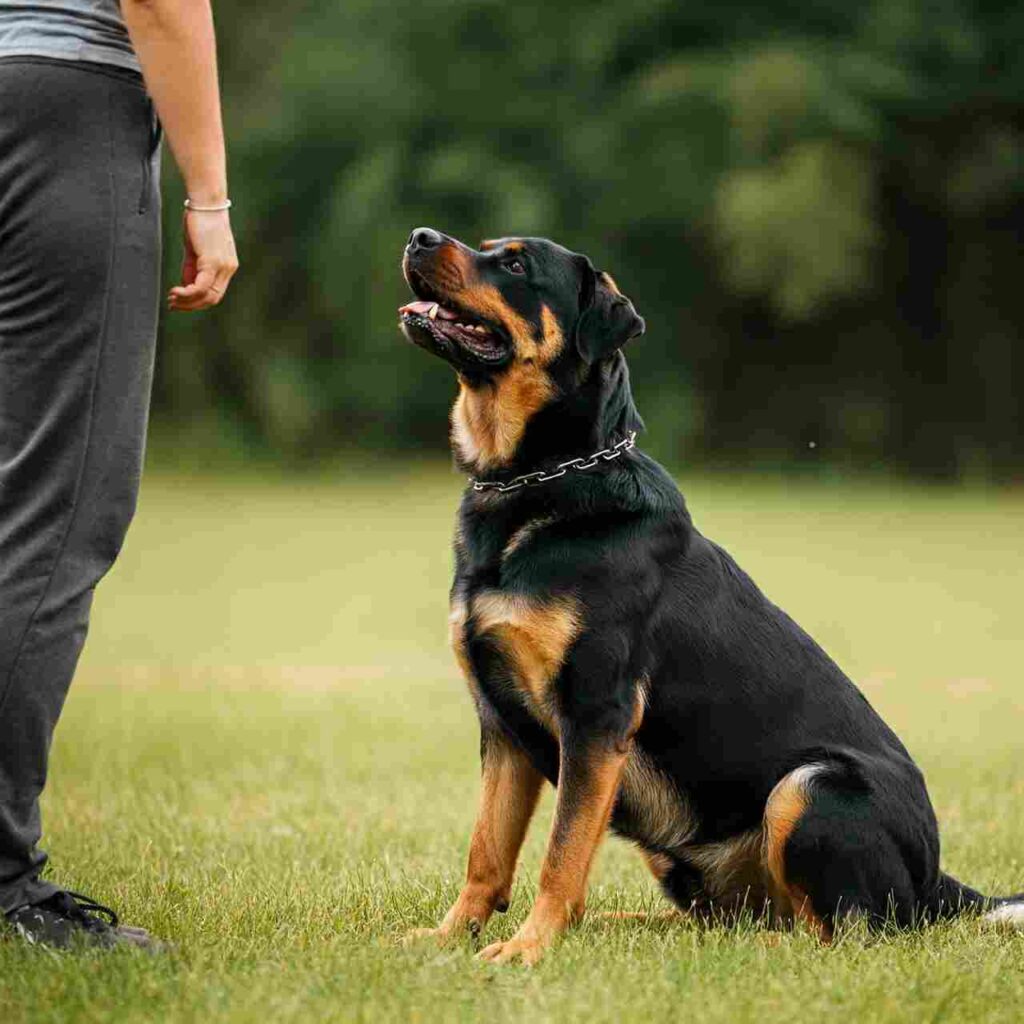
- Start early, stay consistent: The sooner you start training, the better. Shepweilers thrive on routine and clear expectations.
- Positive vibes only: Ditch the punishment and embrace rewards! Think treats, praise, and playtime.
- Training tips:
- Crate training: A safe space for your pup to relax and learn some self-control.
- Basic commands: “Sit,” “stay,” “come” – these are the building blocks of good behavior.
- Leash manners: No one wants a dog that drags them down the street!
- Advanced techniques: Check out methods like “Mark Good Behavior,” “Mirror Me,” and “Tied To You” for even more training success.
Socialization: The World is Your Playground
Socialization is like doggy preschool – it teaches your Shepweiler how to be a well-adjusted member of society. The more they’re exposed to different people, dogs, and environments, the more confident and well-behaved they’ll be.
- Socialization tips:
- Puppy classes: A great way for your pup to learn basic manners and meet new friends.
- Dog parks (with supervision): Let them run and play with other dogs in a safe environment.
- Everyday adventures: Take your Shepweiler on walks in different neighborhoods, visit pet-friendly stores, and introduce them to new people (always with positive reinforcement!).
Nutrition: Fueling the Fun
All that playing and learning requires serious fuel! Shepweilers need a high-quality diet that’s packed with protein and nutrients.
- Choose wisely: Look for dog food formulated for large, active breeds.
- Life stages: Puppies, adults, and seniors all have different nutritional needs. Make sure you’re feeding your Shepweiler the right food for their age.
Grooming: Keeping it Sleek
Shepweilers may not be high-maintenance divas, but they do need some regular grooming to keep their coats healthy and shiny.
- Brushing: Get that brush out a few times a week to prevent mats and control shedding (because, yes, they do shed!).
- Bathing: Occasional baths are all they need.
- Nail trims: Keep those claws in check!
- Ear checks: Make sure those ears are clean and healthy.
With a little TLC, your Shepweiler will be looking and feeling their best!
Health Considerations: A Healthy Shep is a Happy Shep
Okay, let’s get real for a minute. Even the toughest superheroes need a little TLC to stay in tip-top shape, and your Shepweiler is no exception! While they’re generally healthy pups, there are a few things to keep an eye on to ensure your furry friend lives a long and happy life.
Lifespan and Common Health Issues
- How long will my Shepweiler be by my side? Shepweilers typically have a lifespan of 9 to 12 years. That’s a decent chunk of time to share adventures and cuddles!
- Health hurdles: Like their parent breeds, Shepweilers can be prone to certain health issues, including:
- Hip and Elbow Dysplasia: This is a common problem in large breeds, where the joints don’t develop quite right. It can cause pain and mobility problems. Keeping your Shepweiler at a healthy weight and providing regular exercise can help reduce the risk. VCA Animal Hospitals explains that hip dysplasia is a common condition in large breed dogs like Shepweilers.
- Bloat: This is a scary condition where the stomach fills with gas and can even twist. It’s a medical emergency! Feed your Shepweiler smaller, more frequent meals and avoid vigorous exercise after eating to help prevent bloat.

- Other potential problems: Keep an eye out for things like eye conditions, heart problems, and allergies.
Preventative Care: Superhero Health Plan
Prevention is the best medicine! Here’s how to keep your Shepweiler feeling super:
- Vaccinations: Keep those puppy shots up to date! Vaccinations protect your Shepweiler from nasty diseases. According to PetMD, puppy vaccinations are crucial for protecting your Shepweiler from potentially life-threatening diseases.
- Parasite prevention: Fleas, ticks, and heartworm are no fun. Regular preventative meds will keep those pesky critters at bay.
- Dental care: Brush those pearly whites! Dental disease is common in dogs, so regular brushing and dental chews are a must.
- Vet checkups: Regular visits to the vet are like superhero checkups! They can catch any potential problems early on and keep your Shepweiler in top shape.
Veterinary Care: Your Partner in Shepweiler Health
Find a veterinarian you trust and who understands the unique needs of Shepweilers. They’ll be your partner in keeping your furry friend healthy and happy for years to come. Remember, early detection is key to managing any health issues that may arise.
Finding a German Shepherd Rottweiler Mix: Choose Wisely
Okay, you’re convinced that a Shepweiler is your dream dog! But where do you find one of these amazing pups? Don’t worry, we’ve got you covered.
Breeders: Do Your Homework!
Finding a reputable breeder is like finding a superhero sidekick for your Shepweiler journey. They’ll provide you with a healthy, well-adjusted pup and be a valuable resource for years to come.
- Do your research: Don’t just go with the first breeder you find online. Look for breeders who:
- Prioritize health: They should do health testing on their dogs to ensure they’re not passing on any genetic problems.
- Focus on temperament: Ask about the personalities of the parent dogs. Are they friendly? Confident? Well-behaved?
- Socialize their puppies: Early socialization is crucial for Shepweilers. Make sure the breeder is exposing their pups to different people, sights, and sounds.
- Ask questions: Don’t be shy! A good breeder will be happy to answer all your questions. Here are a few to get you started:
- “What health tests have been done on the parents?”
- “Can I meet the parents?”
- “How are the puppies socialized?”
- “What kind of temperament do you breed for?”
- Red flags: Watch out for breeders who:
- Won’t let you meet the parents or see where the puppies are raised.
- Don’t do health testing.
- Seem more interested in making a quick buck than finding the right homes for their puppies.
Adoption: Give a Deserving Dog a Second Chance
Adoption is a fantastic way to find your new best friend! There are many Shepweilers waiting for their forever homes in shelters and rescues.
- Where to look:
- Local shelters: Check with your local animal shelters and humane societies.
- Breed-specific rescues: Search for German Shepherd or Rottweiler rescues in your area. They often have Shepweiler mixes available.
- Online resources: Websites like Petfinder and Adopt-a-Pet can help you find adoptable Shepweilers in your area.
- The adoption process:
- Application: You’ll likely need to fill out an application and maybe even have a home visit.
- Meet and greet: Spend time with the dog to see if it’s a good fit for your family.
- Adoption fees: Adoption fees are typically much lower than breeder prices.
- Potential challenges: Adopting an adult Shepweiler can be incredibly rewarding, but be prepared for potential challenges:
- Unknown history: You may not know much about the dog’s past or any behavioral issues they may have.
- Adjustment period: It may take some time for your new dog to adjust to its new home and routine.
Caring for Your Shepweiler Puppy: A Paw-some Start
Congratulations, you’ve got yourself a Shepweiler puppy! Get ready for a whirlwind of puppy breath, clumsy paws, and endless snuggles. But amidst all the cuteness, remember that those tiny fluffballs need special care to grow into healthy, well-adjusted Super-Sheps.
Grooming and Hygiene: Start ‘Em Young!
Think of grooming as a bonding experience, not a chore! The sooner you start getting your puppy used to being handled, the easier it will be in the long run.
- Brushing: Those adorable puppy coats will eventually become thick and shed-tastic. Start brushing early and often to prevent mats and get your pup used to the sensation.
- Nail trims: Clipping those tiny claws can be tricky, but it’s important to prevent overgrowth and discomfort.
- Ear cleaning: Keep those floppy ears clean and dry to prevent infections.
- Dental hygiene: Introduce toothbrushing early on to prevent doggy dental drama later.
Puppy Vaccinations and Vet Visits: Stay Healthy, Little One!
- Vaccination schedule: Follow your vet’s recommended vaccination schedule to protect your puppy from common canine diseases. Those little immune systems need all the help they can get!
- Vet checkups: Regular checkups are like tune-ups for your puppy. Your vet will monitor their growth, catch any potential problems early on, and answer all your puppy-related questions.
Is a Shepweiler Right for You?
Shepweilers are amazing dogs, but they’re not the perfect fit for every home. Before you jump headfirst into Shepweiler ownership, ask yourself these important questions:
✅ Do you have experience with large, active dog breeds?
Shepweilers are big, strong, and full of energy. They need an owner who can handle their size and provide them with the exercise and mental stimulation they need to thrive.
✅ Are you prepared to commit to consistent training and socialization?
Shepweilers are intelligent but can be stubborn. They need an owner who is dedicated to positive reinforcement training and early socialization to help them become well-mannered and confident companions.
✅ Do you have ample space for a Shepweiler to exercise and play?
A fenced-in yard is ideal, but frequent trips to the dog park or long walks can also work. If you live in an apartment, make sure you’re prepared to provide your Shepweiler with plenty of outdoor time.
✅ Are you prepared for the potential challenges of owning a protective breed?
Shepweilers are natural guardians and may be wary of strangers. Early socialization and training are crucial to help them become well-adjusted and friendly.
If you answered “yes” to all of these questions, then congratulations – you might be ready for a Shepweiler in your life! But if you have any doubts, it’s always best to do some more research or talk to a Shepweiler owner or rescue organization before making a commitment.
Little-Known Facts About Shepweilers: Surprise!
-
Hidden talents: Shepweilers are incredibly versatile dogs. They can excel in a variety of activities, from agility and obedience to therapy work and even search and rescue. Who knows what hidden talents your Shepweiler might have?
-
One-person wonders: While they love their whole family, Shepweilers often develop an extra-special bond with one particular person. This lucky human will be the recipient of endless affection and maybe even a few sloppy kisses.
-
Secret softies: Despite their tough exterior, Shepweilers are actually big cuddle bugs. They love nothing more than snuggling up with their favorite humans. Don't be surprised if your Shepweiler tries to claim a spot on your lap, even if they barely fit!
Final thought
So, you’ve reached the end of our epic Shepweiler adventure! Feeling pumped? We’ve covered everything from those adorable puppy eyes to those powerful Rottweiler genes. Now it’s time to ask yourself: Is this amazing mix my perfect match?
If you’re craving a loyal sidekick who’s always up for fun (and maybe a little mischief), then a Shepweiler might be your dream come true. But remember, these pups need lots of love, exercise, and a sprinkle of training magic.
Ready to take the leap? Do your research, find a breeder or rescue that’s the bee’s knees, and get ready for a lifetime of tail wags and unforgettable adventures with your new Shepweiler bestie!
FAQs: Your Burning Questions Answered!
Q: Are German Shepherd Rottweiler mixes good with kids?
A: Shepweilers can be great with kids, but it's important to remember that they're large, powerful dogs. Always supervise interactions between your Shepweiler and young children, and teach your kids how to interact with dogs respectfully. Early socialization with kids of all ages is key!
Q: How much exercise does a German Shepherd Rottweiler mix need?
A: Buckle up, because these pups are energetic! Aim for at least 60-90 minutes of vigorous exercise daily. Think long walks, runs, hikes, frisbee, agility – anything to get those wiggles out!
Q: What are the common health problems of this mix?
A: Shepweilers can be prone to certain health issues, including hip and elbow dysplasia, bloat, eye conditions, and heart problems. Regular vet checkups and preventative care are crucial!
Q: Where can I find a reputable breeder?
A: Do your research! Look for breeders who prioritize health and temperament, do health testing on their dogs, and socialize their puppies. Ask lots of questions and don't be afraid to visit the breeder's facility.
Q: Are Shepweilers good apartment dogs?
A: Shepweilers can adapt to apartment living, but it requires extra effort. They need plenty of exercise and mental stimulation, so frequent trips to the dog park or long walks are a must. If you live in an apartment, make sure you're prepared for the commitment!
Q: What kind of training do Shepweilers need?
A: Shepweilers are intelligent but can be headstrong. Start training early and be consistent! Positive reinforcement methods work best. Focus on basic obedience, leash manners, and socialization.
Q: How much do Shepweilers shed?
A: Get ready for fur tumbleweeds! Shepweilers are moderate to heavy shedders. Regular brushing will help control the fluff, but be prepared to vacuum often.
Q: What should I feed my Shepweiler?
A: Choose a high-quality dog food formulated for large, active breeds. Puppies, adults, and seniors all have different nutritional needs, so make sure you're feeding your Shepweiler the right food for their age.
Did you know that Shepweilers get half their awesome genes from the mighty Rottweiler? If you’re curious about this guardian breed’s history and unique personality, check out our in-depth guide: 101 Amazing Rottweiler Breed Facts: History, Temperament & Care. You’ll discover fascinating facts about their origins, effective training tips, and why they’re known as ‘man’s best friend.


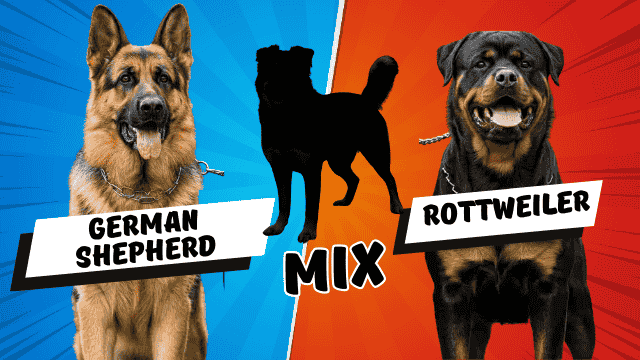


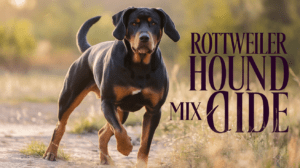
Pingback: 101 Amazing Rottweiler Breed Facts: History, Temperament & Care